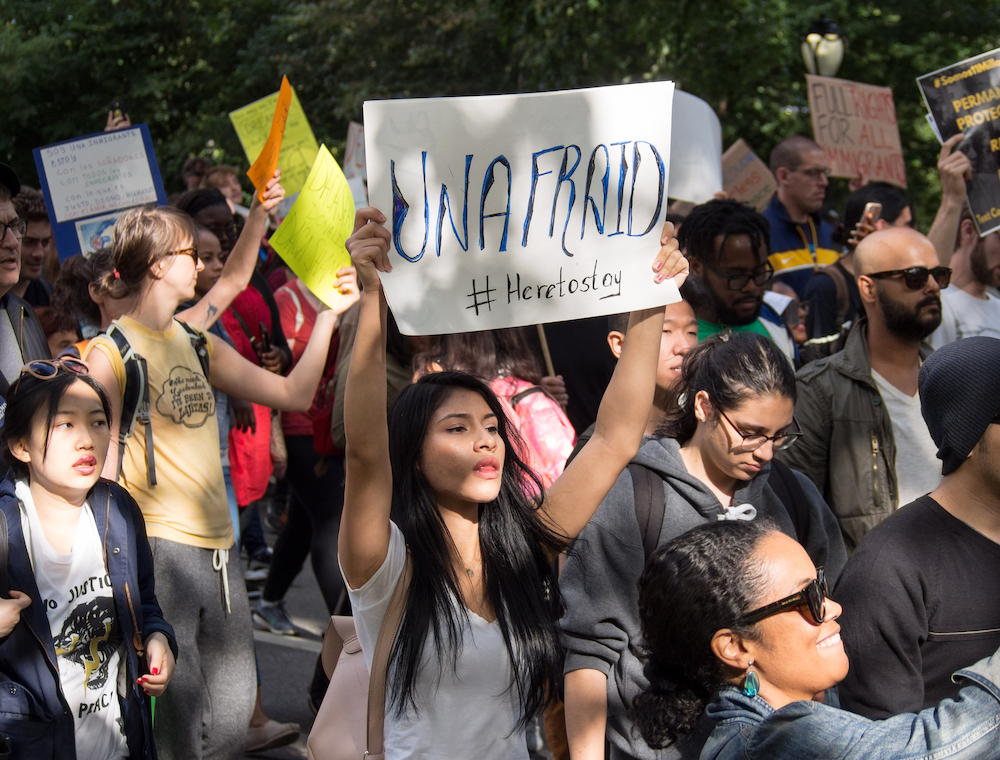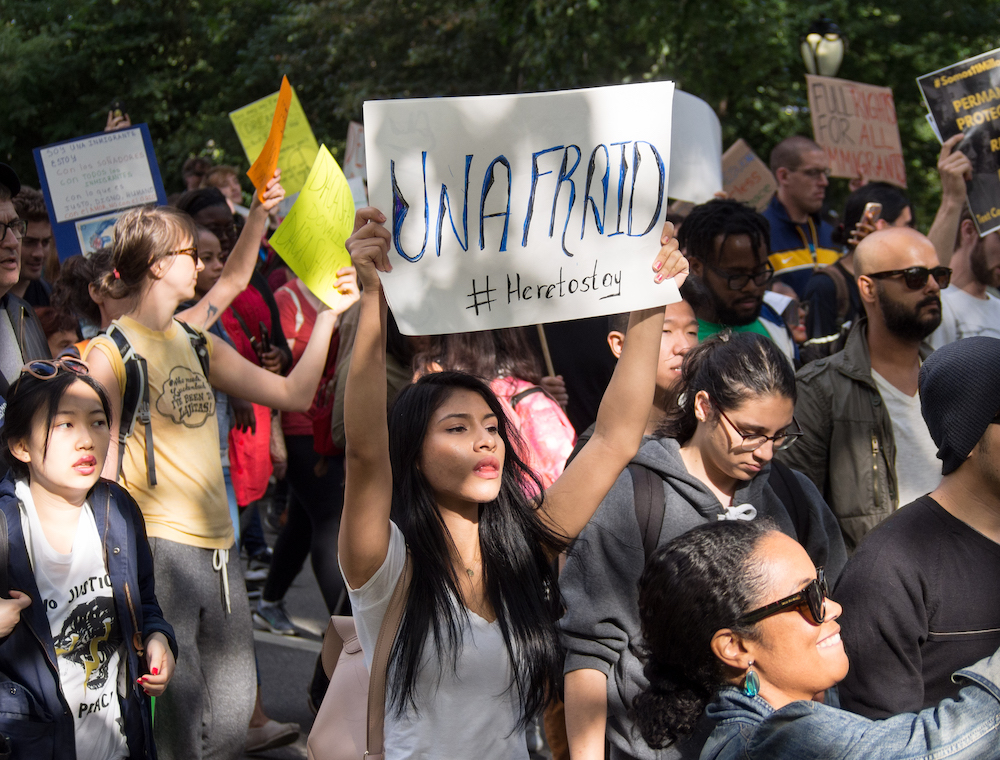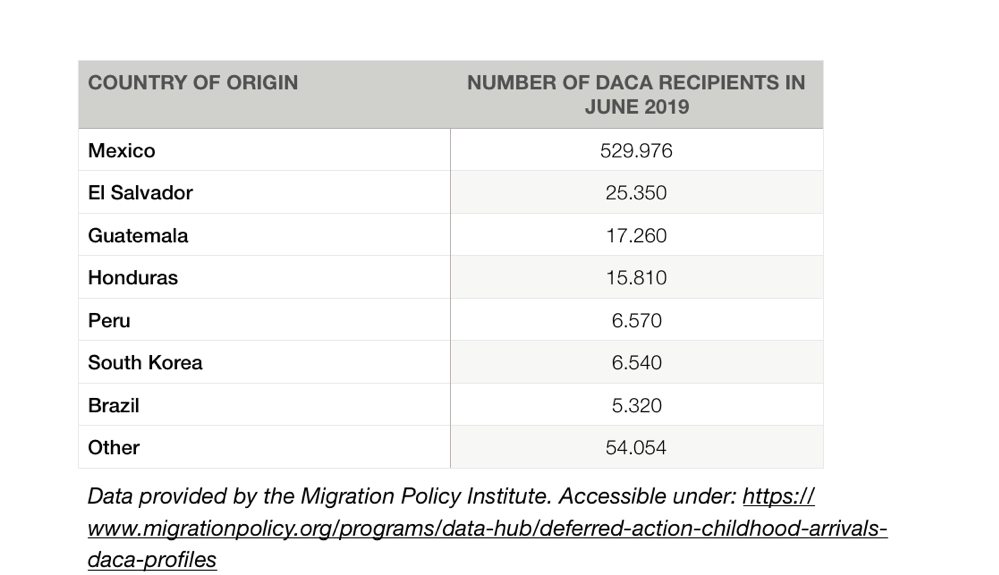Activists Work to Keep Young Immigrant Dreams Alive

OLYMPUS DIGITAL CAMERA

Itzel Hernandez, 26, came to the United States when she was ten years old. In 1994, she and her mother made their way from Puebla, a city in east central Mexico, to meet her father, who was living in California at the time—and in search of the American Dream. After three years of being separated from her father, they entered the U.S. with a visitors’ visa. Later on, the family made their way to New Jersey, where they built a life, had access to education and better life conditions. “I was told to leave everything behind, and so we did,” Hernandez told JPI. “I don’t have an uncle, or an aunt. This is my family.”
Just like a regular and documented U.S. citizen, Hernandez completed her undergraduate and graduate degrees in the states. Following her collegiate career, she found a job and now aims to keep DACA holders’ dreams alive. As an organizer at the American Friends Service Committee, she assists Dreamers with getting information and their DACA documents renewed. This work has become more challenging—and more critical—since the Trump administration’s 2017 immigration policies went into effect and effectively ended applications to the Dreamer program.
According to the latest estimate released by the Office of Immigration Statistics (OIS) at the Department of Homeland Security (DHS), Hernandez was part of the 12 million undocumented immigrants in the U.S. in 2015 and part of the 11 million according to a research by the same OIS in 2017. According to September 2019 data from the United States Citizenship and Immigration Services (USCIS), 652,880 of these are DACA recipients in the United States, and Itzel Hernandez is one of these 660,880 who have uncertain futures ahead of them. This number, however, is likely to change soon. President Trump’s administration is seeking to end the Deferred Action for Childhood Arrivals (DACA) and deport more undocumented immigrants than the Obama administration did. People—particularly immigrants and those with immigrant family members are more afraid than ever.

The Center for American Progress research shows that, since the Trump Administration’s 2017 decision, at least 22,000 DACA recipients have already lost their work permits in the country. These numbers date between Sept. 5, 2017 and March 5, 2018. Data released by the USCIS shows that an additional number of 11,040 DACA holders whose documents expired have had them renewed with USCIS.
Trump stated on Nov. 12 that “many of the people in DACA, no longer very young, are far from ‘angels.’ Some are very tough, hardened criminals.” According to the latest report released by USCIS, 79,398 candidates were approved for DACA despite being arrested. Among them, 3,300 had already been charged with assault and over 300 with abuse or rape; 15 requesters had their documents approved despite being arrested with murder. On the other hand, if looked from a broader perspective, the majority of the arrests were due to non-violent acts and, according to the same report, 90 percent of DACA holders have not been arrested.
“I was told to leave everything behind, and so we did,” Hernandez told JPI. “I don’t have an uncle, or an aunt. This is my family.”
“Immigration issues are about reelection, scapegoating,” Allan Wernick, a specialist in immigration law and the founder of CUNY Citizenship Now said, “You can’t think about Trump’s immigration policies as in something good for America or what is good for immigrants. It is about keeping Trump in power.” Wernick firmly believes that Trump is trying to drive people to the poll in controversial issues, such as immigration. On Daily News, Wernick wrote “I remain hopeful that the Court will keep the program alive.”
In this context, several institutions decided to dedicate their time and resources to the DACA cause. This is the case of organizations such as FWD.us, which advocates for important reforms in the fields of policy, advocacy in the technology industry, and of course, DACA. “The program is incredibly valuable”, press manager Leezia Dhalla said. A Dreamer herself, Dhalla came to the United States when she was six years old and grew up without knowing she was an undocumented immigrant in the country.
FWD.us believes in advocating accessible policy changes that will help the justice and immigration systems through mobilization in civil society and also in the tech community. To do so, they created three teams responsible to mobilize civil society and demand changes. According to Dhalla, “the public is increasingly supportive” and the majority of the public supports some kind of immigration reform. She believes in a “Dream Act” which will allow “Dreamers” to gain full citizenship in the US.
On the other hand, opponents to the program allege that the way in which Obama created the program is illegal. President Donald Trump, for example, argues that his predecessor’s actions were an abuse of power since he issued an executive order without the approval of Congress and, according to the opposition, violated Article I, Section 8 of the Constitution. This section grants Congress authority to determine U.S. immigration rules. On Oct. 9 he tweeted that former president Obama did not have the right to sign DACA and that “it will never hold up in court” because it “gives the President extraordinary powers, far greater than ever thought.”
A yearly poll conducted by Gallup shows that the support for immigration in the United States is on the rise. According to numbers provided by the company, 76 percent of the American public believe that immigration is a good thing. This number rose 1 percent in comparison to the same period last year, 5 percent in comparison to 2017 and 13 percent in comparison to 2014. However, another poll which dates back to January 2019 shows that, compared to 2016, the number of people who strongly support deportation of illegal immigrants has decreased to 3 percent. The number of supporters of deportation, nevertheless, remains relatively low (17 percent).
It is still not clear what could happen if the Supreme Court upholds the Trump policy. Legal experts, however, do not believe that recipients will be deported as soon as the program shuts down. Wernick explains that it is likely that, if the program indeed ends, Dreamers will probably not be able to renew their work permits and that they are likely “going to lose their employment authorization when the DACA expires.” According to the program requirements, people who came the US undocumented as children are first eligible to apply to DACA when they turn 16. This process, however, has been put on hold since 2017 and now, only document renewal is allowed.
Currently, there is not much to do besides waiting for the Supreme Court’s decision, which is scheduled for sometime between January and June 2020. Potential DACA holders, such as fifteen year- old children who were brought to the U.S. illegally, therefore, have nothing to do and their futures remain uncertain. “In New Jersey, there are 22.000 people willing to apply,” Hernandez says. “This is an increase in the number of people who are eligible for the program, however, because of its termination, they can’t anymore.”
While the Supreme Court does not make a decision, what organizations such as the American Friends Service Committee are trying to do is to assist students in anyway they can. “It is important for students to know their rights and options and to make sure that they have access to legal advice concerning their status here in the U.S.,” Hernandez adds. She goes to schools, churches and presents to different publics to make sure that the organization is helping the community.
Although it is hard to guess the future of DACA holders, Wernick believes that the Supreme Court will send the case back for more deliberation, that means that they will likely send it back to lower courts to avoid making a decision. In the meantime, 652,880 persuasions of the American Dream are still on in the country and organizations will not stop until the battle for an equal future for all workers is won.
“Civil society is also mobilizing” Hernandez says. She refers to the several pro DACA protests happening since the termination of the program in 2017. A notable one happened just after the Trump administration announced the end of the program in front of the Trump Tower in New York City. “We are showing the Supreme Court that we are here,” Hernandez said. After the demonstrations, 34 protesters were arrested. Hernandez adds that these mobilizations are crucial and may have an impact on the Supreme Court’s decision. “This is the beginning of a new fight against the administration, and our fight will never stop.”
Marina Guimarães is pursuing a joint master’s degree at NYU in journalism and international relations after concluding her BA in political science, with focus on international relations and the Middle East, in Nuremberg, Germany. She is also the author of her own blog, Between Borders, where she writes about the Middle East, refugees and Brazil, where she was born and raised.




